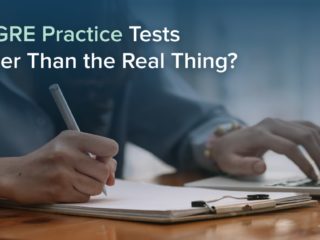Last Updated on April 26, 2023
Sentence Equivalence (SE) questions comprise about 20% of the GRE verbal questions you’ll face on test day. Although people preparing for the GRE often stress about these questions, there is actually little to worry about. With some hard work and savvy GRE prep, GRE Sentence Equivalence questions can become questions you consistently answer correctly and even look forward to solving.
With some hard work and savvy GRE prep, Sentence Equivalence questions can become questions you consistently answer correctly.”
If you’d like to practice with some high-value sample GRE Sentence Equivalence questions, we have several for you in this article. In addition, we’ll discuss some tips and tricks to help improve your skills in this GRE question type, so read on!
Before we practice sample Sentence Equivalence exercises, let’s take a minute to talk about what GRE Sentence Equivalence questions are.
- What Are GRE Sentence Equivalence Questions?
- How Many Sentence Equivalence Questions Are on the GRE?
- Is Partial Credit Given on Sentence Equivalence Questions?
- How to Improve Your Sentence Equivalence Skills
- What’s Next?
What Are GRE Sentence Equivalence Questions?
Sentence Equivalence questions consist of a single sentence that contains one blank and six answer choices. These questions ask you to select two different answer choices to fill the blank. Your answers must (1) create a complete, logical sentence and (2) create two sentences that convey the same meaning. In other words, our task in Sentence Equivalence questions is to choose answers that result in sentences that have equivalent meanings.
The directions that ETS provides for these questions is as follows:
Select the two answer choices that, when used to complete the sentence, fit the meaning of the sentence as a whole and produce complete sentences that are alike in meaning.
“Our task in Sentence Equivalence questions is to choose answers that result in sentences that have equivalent meanings.”
On test day, Sentence Equivalence questions will appear as follows:
Let’s now discuss how many Sentence Equivalence questions are on the GRE.
How Many Sentence Equivalence Questions Are on the GRE?
In the Verbal sections of the GRE, about half of the total of 40 Verbal questions (remember, on the GRE you’ll see two 20-question Verbal sections) are either Text Completion (TC) or Sentence Equivalence (SE) questions. Thus, you can expect to see 8-10 Sentence Equivalence questions on the GRE.
KEY FACT:
On the GRE, you can expect to see 8-10 Sentence Equivalence questions.
If you’ve prepared properly, there is no reason why you can’t correctly answer most, or even all, of these questions.
Remember, each GRE verbal question on the exam is worth the same number of points. (In fact, each question on the GRE is worth the same number of points). Thus, it’s in your best interest to first answer the questions that you know you can solve, and then work on the ones that are more difficult for you. This way, you maximize the number of points you’ll score.
TTP PRO TIP:
Since each GRE verbal question is worth the same number of points, first solve the questions that are easy for you, and then work your way through any that are more difficult.
Let’s now discuss whether partial credit is awarded on Sentence Equivalence questions.
Is Partial Credit Given on Sentence Equivalence Questions?
Since two answers must be chosen, students often wonder whether they can earn partial credit on Sentence Equivalence questions.
Unfortunately, there is no partial credit on Sentence Equivalence questions. (In fact, there is no partial credit for any type of GRE question.) So, if you choose only one answer in an SE question, instead of the required two, or if you choose one correct and one incorrect answer, the question will be marked incorrect.
KEY FACT:
There is no partial credit given on Sentence Equivalence questions. You must choose two correct answers in order to get the question correct.
As promised, we now have a few tips for how you can improve your skills in answering Sentence Equivalence questions.
How to Improve Your Sentence Equivalence Skills
The good news is that there is a lot you can do to improve your Sentence Equivalence skills. The following three tips will help you do just that.
Let’s begin with a discussion of why you must go beyond just learning vocabulary words.
Tip #1: Sentence Equivalence Questions Test More Than Just Vocabulary
Success with Sentence Equivalence questions starts with your vocabulary knowledge. The truth is, building your vocabulary is an integral aspect of performing well on these questions; you’d be wise to use a solid GRE vocabulary list and use flashcards to help you memorize the words.
TTP PRO TIP:
Building your vocabulary is an integral aspect of performing well on Sentence Equivalence questions.
While vocabulary knowledge serves as a necessary foundation for correctly answering SE questions, such knowledge is definitely not the only ingredient in the “recipe” for finding correct answers.
What Sentence Equivalence tests, in addition to your vocabulary knowledge, is your ability to understand the structure and logic of sentences and the particular meanings that words convey in different contexts. Thus, mastering thousands of GRE-specific vocabulary words will not, in and of itself, make you a master of Sentence Equivalence questions.
TTP PRO TIP:
In addition to testing vocabulary knowledge, Sentence Equivalence questions test your ability to analyze the structure, overall meaning, key details, and logic of sentences.
Notice that in the following example question, vocabulary knowledge alone won’t get us to the correct answer. In fact, the vocabulary isn’t even particularly challenging.
GRE Sentence Equivalence Practice Question #1
Despite the fact that Coleridge was once cited as one of the most __________ British philosophers of the eighteenth century, today he is almost exclusively revered as a poet.
- preeminent
- ignored
- obscure
- overlooked
- renowned
- mischaracterized
Solution:
The keyword “despite” signals a contrast between the sentence portion containing the blank and the known information that “today he is almost exclusively revered as a poet.”
However, we should notice that there is already a contrast present in the information given in the sentence: the contrast between being a philosopher and being “almost exclusively revered as a poet.” Let’s keep this contrast between philosopher and poet in mind as we’re evaluating answer choices.
Choice (A), preeminent, pairs with choice (E), renowned, as both mean “famous” or “celebrated.” And although preeminent/renowned agree with the concept of being “revered” (respected and admired) they do still create a logical contrast: a contrast between being known as a philosopher and being known as a poet.
Despite the fact that Coleridge was once cited as one of the most preeminent/renowned British philosophers of the eighteenth century, today he is almost exclusively revered as a poet.
This synonym pair makes sense in context, but let’s go through the other choices just to be sure there isn’t a more fitting pair.
Choice (B), ignored, pairs with choice (D), overlooked. However, being “cited as one of the most ignored/overlooked British philosophers” does not contrast with being “almost exclusively revered as a poet.” Those two things could be perfectly in keeping with each other. Notice that this synonym pair would work only if the contrast were between being ignored as a poet and being revered as a poet. But since we are contrasting philosopher with poet, these answer choices don’t create the contrast we need. Eliminate (B) and (D).
The only choices left are (C) and (F), “obscure” (little known) and “mischaracterized” (not accurately described), which do not create equivalent sentence meanings, and thus cannot possibly be correct.
Thus, preeminent/renowned are the only logical pair to complete the sentence.
Answer: A, E
You may have noticed that we focused on finding synonym pairs in the question above. Let’s now discuss why synonyms are important in Sentence Equivalence questions.
Tip #2: Pay Attention to Synonym Pairs in Sentence Equivalence Questions
Here’s a secret: in the answer choices of many Sentence Equivalence questions, there are two synonym pairs. In other words, there are two sets of synonyms, which are different words that convey the same meaning.
In addition to the two synonym pairs, we’ll often see two words that don’t have a synonym among the six answer options. These two words that don’t have a synonym among the answer choices are the “lone answer choices.” For example, in Practice Question #1, we saw that “obscure” and “mischaracterized” are the lone answer choices.
The correct answer can’t come from the lone answer choices because those words don’t have the same meaning. Think about it: if we need to choose two words that create sentences that have equivalent meanings, then the words we choose will need to be synonyms, right?
Thus, we know that the words we choose as answers must come from the synonym pairs.
TTP PRO TIP:
In Sentence Equivalence questions, answer choices that don’t pair as synonyms with any other choice will not be correct.
Let’s keep this idea in mind as we work through another Sentence Equivalence practice question.
GRE Sentence Equivalence Practice Question #2
The countries’ rigid stances on the issues made them __________ in treaty negotiations.
- adaptable
- inflexible
- dissatisfied
- immovable
- malleable
- optimistic
Solution:
Remember, we must select two answers that logically complete the sentence such that the meaning of the sentence is equivalent. So, let’s go through the answer choices in order, pairing them with their synonyms (if present) as we go.
Choice (A), adaptable (flexible, adjustable), is the opposite of what would logically complete the sentence. After all, if the countries have “rigid (not flexible) stances,” then it does not make sense that the countries would be “adaptable” in negotiations.
So, we can eliminate choice (A) and its synonym, choice (E), malleable, which creates the same illogical sentence meaning.
Choice (B), inflexible, is an antonym (word meaning the opposite) of adaptable/malleable, the answer pair we just eliminated as the opposite of what we need. Thus, “inflexible” is logical in the given context.
Notice also that “inflexible” is a synonym of the word “rigid,” which appears in the sentence and is also an antonym of adaptable/malleable. In this context, a synonym of “rigid” makes sense to complete the sentence, because if the countries have “rigid stances,” as the sentence says, then the countries logically would be “inflexible” in negotiations.
Choice (D), immovable, creates essentially the same sentence meaning as “inflexible” in this context. Thus, we have found a logical synonym pair with which to complete the sentence. However, let’s evaluate the remaining two answer choices just in case.
Although choice (C), dissatisfied, could be logical in context, the only answer remaining for “dissatisfied” to pair with is choice (F), optimistic, which in this context conveys essentially the opposite meaning of “dissatisfied.”
Since these two remaining choices do not create the same sentence meaning (or pair with any other answer to create the same meaning), they cannot possibly be correct. So, we can eliminate both (C) and (F) as lone answer choices.
Thus, choices (B) and (D), inflexible/immovable, are the only two answers that accomplish both of the required tasks in an SE question: logically completing the sentence and creating equivalent sentence meanings.
Answer: B, D
Let’s now discuss why it’s important to determine whether sentences convey contrast or agreement.
Tip #3: Determine Whether Sentences Convey Contrast or Agreement
A sentence that conveys contrast shows that there is some sort of disagreement, conflict, or contradiction between things. Those things could be people, ideas, events, actions, opinions, and so on.
Any sentence that does not convey contrast, by default, conveys agreement. Agreement could come in the form of providing an example or an explanation, describing similarities, showing cause and effect, and so on.
A key step we can take in solving Sentence Equivalence questions is to pay close attention to whether a sentence conveys contrast or agreement. Be aware also that sentences can have multiple points of contrast and agreement.
TTP PRO TIP:
A key step we can take in solving Sentence Equivalence questions is to pay close attention to whether a sentence conveys contrast or agreement.
Let’s consider another example question.
GRE Sentence Equivalence Practice Question #3
Though she was the first female astronomer in the United States, and her discovery of a comet was renowned at the time, Maria Mitchell is __________ mentioned in history textbooks.
- rarely
- constantly
- never
- incessantly
- seldom
- intermittently
Solution:
There are a couple of points of contrast and agreement in the sentence. The keyword “and” signals that “she was the first female astronomer in the United States” agrees with “her discovery of a comet was renowned at the time.” Given the contrast signal “though,” we can see that those two statements together should contrast with the final statement, which is the statement containing the blank.
Thus, choice (A), rarely, which pairs with choice (E), seldom, makes sense, because both of those words mean “not often” or “almost never.” After all, both being the first female astronomer and discovering a comet certainly contrast with being “rarely/seldom mentioned in history textbooks.” We would expect a person of such accomplishment to be often mentioned in textbooks.
“Constantly/incessantly mentioned in history textbooks” is in keeping with being the first female astronomer and discovering a comet, so this synonym pair is the opposite of what makes sense in context. Eliminate (B) and (C).
The remaining two choices are lone choices, “never” and “intermittently” (at irregular intervals). Since they are not synonyms, and thus do not create equivalent sentence meanings, they can’t be correct.
Therefore, the only synonym pair that logically completes the sentence answer is rarely/seldom:
Though she was the first female astronomer in the United States, and her discovery of a comet was renowned at the time, Maria Mitchell is rarely/seldom mentioned in history textbooks.
Answer: A, E
What’s Next?
We’ve given you some useful tips for solving Sentence Equivalence questions on the GRE. You’ve discovered that SE questions are much more than just vocabulary questions, that they test your ability to find the synonym pairs that logically complete the sentence and create equivalent meanings. You’ve discovered that a key to finding the correct synonym pair often rests on your ability to find and interpret the contrast words or the agreement words in the question. With these tips (and some additional practice), you will find that SE questions will put a smile on your face when you encounter them on the GRE because you will be confident in your ability to answer them correctly.
If you’re ready to roll up your sleeves and start your studying with a top-rated self-study GRE prep course, Target Test Prep has you covered. We’ll efficiently walk you step-by-step through everything you’ll need to know to earn a great GRE score!



